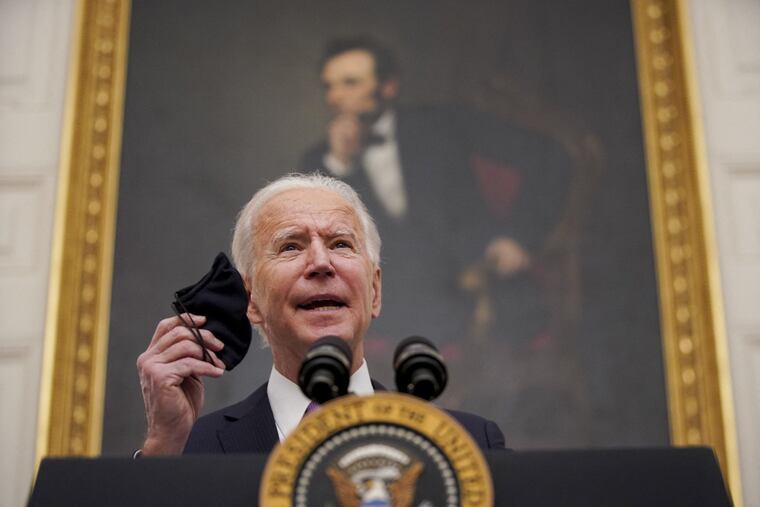Joe Biden’s plan for federally run mass COVID-19 vaccination sites takes shape
On his first day in office, Joe Biden directed the Federal Emergency Management Agency to establish federally supported vaccination centers, with the goal of setting up 100 sites in the next month.

WASHINGTON — On his first day in office, President Joe Biden directed the Federal Emergency Management Agency to establish federally supported vaccination centers, with the goal of setting up 100 sites in the next month.
The plan is already taking shape in the form of a draft "Concept of Operations," which was obtained by The Washington Post. The document envisions FEMA, previously enlisted piecemeal in pandemic response, fully unleashed.
Its mission will be to "provide federal support to existing or new community vaccination centers and mobile clinics across the country."
"FEMA … will mobilize thousands of clinical and non-clinical staff and contractors who will work hand-in-glove with the National Guard and state and local teams to assist, augment, and expedite the distribution and administration of covid-19 vaccines," the document states.
If requested by states and other jurisdictions, the draft notes, "the U.S. Government would develop, equip, provide information management, and staff and operate the site." Shots administered at these sites are expected to draw on the vaccine supply made available to individual states and territories, and some large cities, rather than relying on a new federal allocation stream. A lack of abundant vaccine supply will remain the most pressing problem, probably through March.
» READ MORE: What happens when the COVID-19 vaccine enters your arm
Enlisting FEMA, an agency of the Department of Homeland Security, is among the clearest signals that Biden intends to involve the federal government more directly in the administration of vaccines, instead of leaving the final step of the massive effort to state and local authorities.
The Trump administration, which oversaw the rapid progress in developing a half-dozen vaccine candidates, faced criticism in its closing days for not planning sufficiently for the ground-level hurdles to immunization, from workforce shortages to aging computer systems. Many states have already set up mass vaccination clinics, but officials say assistance will be needed to make sure the most people possible are vaccinated.
Others disagreed with the Biden administration's efforts, in a sign that greater federal coordination is already becoming politically charged. Florida Republican Gov. Ron DeSantis, a close Trump apply, ridiculed the plan this week, referring to the anticipated centers as "FEMA camps."
"I can tell you, that's not necessary in Florida," he said.
But the plan was welcomed by FEMA officials throughout the country, who spoke on the condition of anonymity because they had not been authorized to address the efforts.
One official said he was moved to tears by the new sense of purpose. “It’s amazing what we can do when we take the gloves off,” the official said. Another recounted a regional planning call in which emergency managers were discussing how to get additional information from states about the gaps in their existing infrastructure. Biden administration officials have begun calling states to consult with them about how federal assistance could augment their capacity, according to people familiar with the calls.
The draft outlines four possible sizes for federally administered sites. The largest, called the "Mega Model," would be able to administer 6,000 doses a day but require a space at least as large as 15,000 square feet. The smallest would extend across just 2,500 square feet and be able to handle 250 doses a day.
At the same time, the planning document sketches out hurdles to immediate involvement by FEMA personnel in some aspects of immunization, especially administration of shots, because of licensing requirements. Biden's strategy encourages states to bolster their workforce, including by "expanding scope of practice laws and waiving licensing requirements as appropriate." It also aims to allow state and local governments to receive greater reimbursement for vaccine administration expenses through the FEMA Disaster Relief Fund.
» READ MORE: No phone hotlines, multiple websites, long lines: Getting a COVID-19 vaccine is confusing in Pa. and N.J.
The draft FEMA initiative notes that federal managers will need to review local regulations "when determining clinic staffing and assignment of roles and responsibilities."
"Depending on the situation, and authorization from the State Commissioner of Health, non-medical personnel may be utilized for positions normally requiring a medical license/certificate," the draft states.
FEMA had a leading role in the Trump administration’s early effort to locate and deliver medical equipment to the front line of the pandemic — an initiative known as Project Airbridge. That effort was phased out last summer, however, and the agency’s role in the pandemic response became highly uneven, especially as the Trump administration insisted on delegating responsibility to the states.
Biden’s covid-19 supply coordinator, Tim Manning, is a former FEMA official. The president’s pick to lead the agency, Deanne Criswell, is New York City’s emergency management commissioner. She would be the first woman to lead the agency.